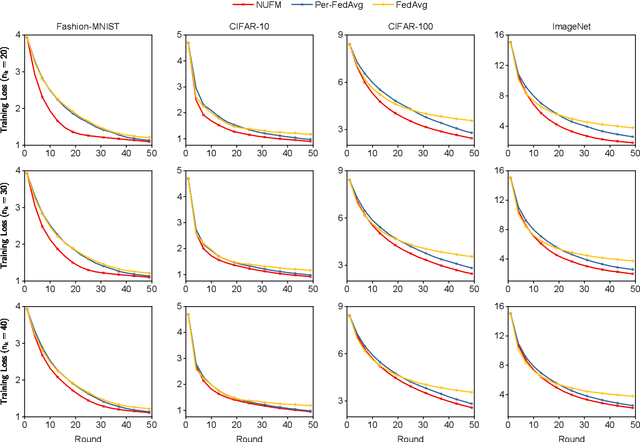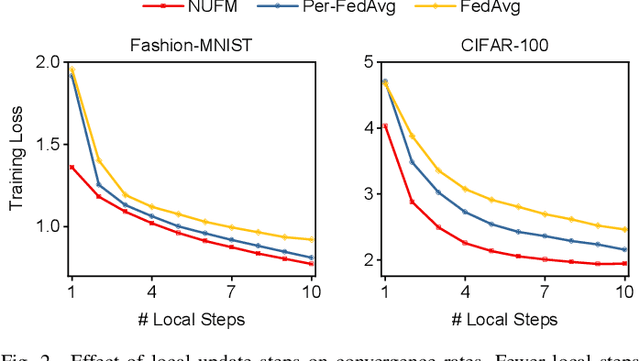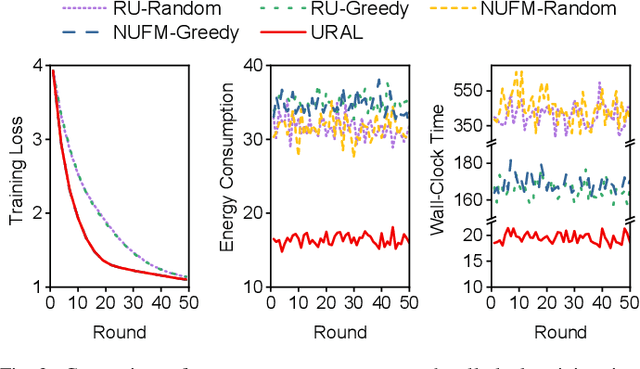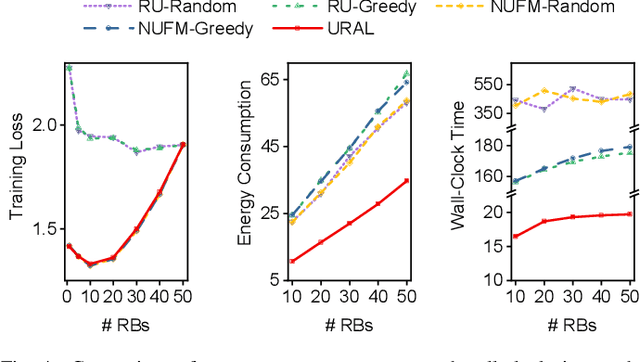Jiang Xin
ADMarker: A Multi-Modal Federated Learning System for Monitoring Digital Biomarkers of Alzheimer's Disease
Oct 23, 2023



Abstract:Alzheimer's Disease (AD) and related dementia are a growing global health challenge due to the aging population. In this paper, we present ADMarker, the first end-to-end system that integrates multi-modal sensors and new federated learning algorithms for detecting multidimensional AD digital biomarkers in natural living environments. ADMarker features a novel three-stage multi-modal federated learning architecture that can accurately detect digital biomarkers in a privacy-preserving manner. Our approach collectively addresses several major real-world challenges, such as limited data labels, data heterogeneity, and limited computing resources. We built a compact multi-modality hardware system and deployed it in a four-week clinical trial involving 91 elderly participants. The results indicate that ADMarker can accurately detect a comprehensive set of digital biomarkers with up to 93.8% accuracy and identify early AD with an average of 88.9% accuracy. ADMarker offers a new platform that can allow AD clinicians to characterize and track the complex correlation between multidimensional interpretable digital biomarkers, demographic factors of patients, and AD diagnosis in a longitudinal manner.
Robust Ellipsoid-specific Fitting via Expectation Maximization
Oct 26, 2021



Abstract:Ellipsoid fitting is of general interest in machine vision, such as object detection and shape approximation. Most existing approaches rely on the least-squares fitting of quadrics, minimizing the algebraic or geometric distances, with additional constraints to enforce the quadric as an ellipsoid. However, they are susceptible to outliers and non-ellipsoid or biased results when the axis ratio exceeds certain thresholds. To address these problems, we propose a novel and robust method for ellipsoid fitting in a noisy, outlier-contaminated 3D environment. We explicitly model the ellipsoid by kernel density estimation (KDE) of the input data. The ellipsoid fitting is cast as a maximum likelihood estimation (MLE) problem without extra constraints, where a weighting term is added to depress outliers, and then effectively solved via the Expectation-Maximization (EM) framework. Furthermore, we introduce the vector {\epsilon} technique to accelerate the convergence of the original EM. The proposed method is compared with representative state-of-the-art approaches by extensive experiments, and results show that our method is ellipsoid-specific, parameter free, and more robust against noise, outliers, and the large axis ratio. Our implementation is available at https://zikai1.github.io/.
Efficient Federated Meta-Learning over Multi-Access Wireless Networks
Sep 01, 2021



Abstract:Federated meta-learning (FML) has emerged as a promising paradigm to cope with the data limitation and heterogeneity challenges in today's edge learning arena. However, its performance is often limited by slow convergence and corresponding low communication efficiency. In addition, since the available radio spectrum and IoT devices' energy capacity are usually insufficient, it is crucial to control the resource allocation and energy consumption when deploying FML in practical wireless networks. To overcome the challenges, in this paper, we rigorously analyze each device's contribution to the global loss reduction in each round and develop an FML algorithm (called NUFM) with a non-uniform device selection scheme to accelerate the convergence. After that, we formulate a resource allocation problem integrating NUFM in multi-access wireless systems to jointly improve the convergence rate and minimize the wall-clock time along with energy cost. By deconstructing the original problem step by step, we devise a joint device selection and resource allocation strategy to solve the problem with theoretical guarantees. Further, we show that the computational complexity of NUFM can be reduced from $O(d^2)$ to $O(d)$ (with the model dimension $d$) via combining two first-order approximation techniques. Extensive simulation results demonstrate the effectiveness and superiority of the proposed methods in comparison with existing baselines.
Inexact-ADMM Based Federated Meta-Learning for Fast and Continual Edge Learning
Dec 19, 2020



Abstract:In order to meet the requirements for performance, safety, and latency in many IoT applications, intelligent decisions must be made right here right now at the network edge. However, the constrained resources and limited local data amount pose significant challenges to the development of edge AI. To overcome these challenges, we explore continual edge learning capable of leveraging the knowledge transfer from previous tasks. Aiming to achieve fast and continual edge learning, we propose a platform-aided federated meta-learning architecture where edge nodes collaboratively learn a meta-model, aided by the knowledge transfer from prior tasks. The edge learning problem is cast as a regularized optimization problem, where the valuable knowledge learned from previous tasks is extracted as regularization. Then, we devise an ADMM based federated meta-learning algorithm, namely ADMM-FedMeta, where ADMM offers a natural mechanism to decompose the original problem into many subproblems which can be solved in parallel across edge nodes and the platform. Further, a variant of inexact-ADMM method is employed where the subproblems are `solved' via linear approximation as well as Hessian estimation to reduce the computational cost per round to $\mathcal{O}(n)$. We provide a comprehensive analysis of ADMM-FedMeta, in terms of the convergence properties, the rapid adaptation performance, and the forgetting effect of prior knowledge transfer, for the general non-convex case. Extensive experimental studies demonstrate the effectiveness and efficiency of ADMM-FedMeta, and showcase that it substantially outperforms the existing baselines.
 Add to Chrome
Add to Chrome Add to Firefox
Add to Firefox Add to Edge
Add to Edge